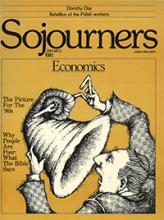If a poll were to be taken in North American churches concerning the causes of poverty, the results might be quite revealing. The major cause of poverty is widely assumed to be "underdevelopment." Other prominent factors are believed to be laziness (we've all read about those exemplary ants in Proverbs 6), vices such as drunkenness, and, however subtly and discreetly expressed, the supposed racial and national inferiority of certain peoples. It's a very comforting worldview and one that our most popular politicians delight to propagate.
But if you look up "underdevelopment" in a concordance, even an exhaustive one, it makes for a very short "quiet time": You find precisely nothing. The Bible contains a few scattered references attributing certain instances of poverty to laziness, drunkenness, and other assorted causes, but hardly enough to substantiate any of them as the basic cause.
Looking up the words "oppress" and "oppression" in the concordance discloses an overwhelming avalanche of texts, however, representing 15 Hebrew roots and two Greek, occurring more than 300 times. Following through the concordance study with references to standard Hebrew and Greek lexicons uncovers even more references, many of them obscured by the traditional translations.
If the biblical vocabulary for oppression is then correlated with the vocabulary for the poor and poverty, we find that in 122 texts oppression is indicated as the cause of poverty. The Hebrew lexicons even indicate an overlapping of meaning in some cases, so some words for poor should be translated the "oppressed-poor." Other causes for poverty, such as laziness, are mentioned in very few texts, though somehow these are the texts we have heard most about.
Read the Full Article

